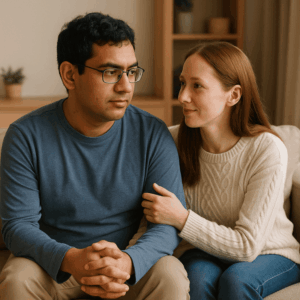Autism and Marriage: Can Autistic Individuals Have Fulfilling Relationships?
 💍 The Common Question:
💍 The Common Question:
“Can someone with autism get married?”
“Will they understand love, intimacy, and commitment?”
The short answer: Yes.
Autistic individuals can and do marry—many lead deeply committed, emotionally fulfilling, and long-lasting relationships. But they may approach love differently, and often need better understanding, communication strategies, and societal support.
🧠 Understanding Autism in the Context of Relationships
Autism Spectrum Disorder (ASD) affects:
-
Social communication
-
Emotional reciprocity
-
Sensory processing
-
Flexibility in thinking and behavior
This doesn’t mean a lack of desire for companionship—but it may mean:
-
Difficulty initiating or interpreting romantic signals
-
Discomfort with physical closeness or unpredictability
-
Struggles with expressive emotional language
-
Need for personal space and routines
❤️ What Love May Look Like in Autism
Autistic individuals may:
-
Express affection through actions, not words
-
Prefer structured expressions (e.g., regular check-ins, written notes)
-
Be very loyal and committed once connected
-
Struggle with verbal reassurance, but show deep concern in other ways
-
Value honesty and consistency in relationships
Many partners report a refreshing absence of game-playing and genuine emotional depth.
💬 Common Challenges in Autism and Marriage
1. Communication Gaps
-
Difficulty expressing needs, feelings, or apologies
-
Taking things literally or missing sarcasm or subtle cues
-
Partner may feel “unheard” or “disconnected”
2. Sensory and Intimacy Differences
-
May avoid touch or seek it differently
-
Unusual sleep habits, hygiene routines, or sensory boundaries
-
Differences in sexual expression or pace of relationship
3. Social Expectations and In-Law Pressure
-
Difficulty “performing” social roles expected by families
-
Misunderstanding or being misunderstood by relatives
-
Struggles with joint family dynamics in Indian households
4. Mental Health Overlaps
-
Higher rates of anxiety, depression, or rigid coping patterns
-
Late-diagnosed adults may carry trauma from mislabeling or unmet expectations
👩❤️👨 Success Factors in Autistic Marriages
-
Psychoeducation: Both partners should learn about autism together
-
Couples therapy with neurodiversity-affirming therapists
-
Open agreements about sensory needs, routines, and alone time
-
Use of text or visual communication for hard conversations
-
Clear boundaries and planning around parenting, finances, roles
-
Support groups (online or local) where partners share coping strategies
💬 Real-Life Story (Anonymized)
Karthik, a 34-year-old autistic man with high verbal ability, married Divya, a teacher who appreciated his honesty and deep thinking. Initial conflicts emerged around his rigidity and literal thinking. With therapy and shared routines, they now co-parent a daughter, balancing roles with respect and structured affection.
📍 Dr. Srinivas Rajkumar T
Consultant Psychiatrist – Child, Adolescent & Geriatric Psychiatry
Apollo Clinics Velachery & Tambaram | Mind & Memory Lab
🌐 www.srinivasaiims.com | 📞 +91 85951 55808
Providing neurodiverse-friendly relationship therapy, adult autism evaluations, and marriage counseling for late-diagnosed individuals.